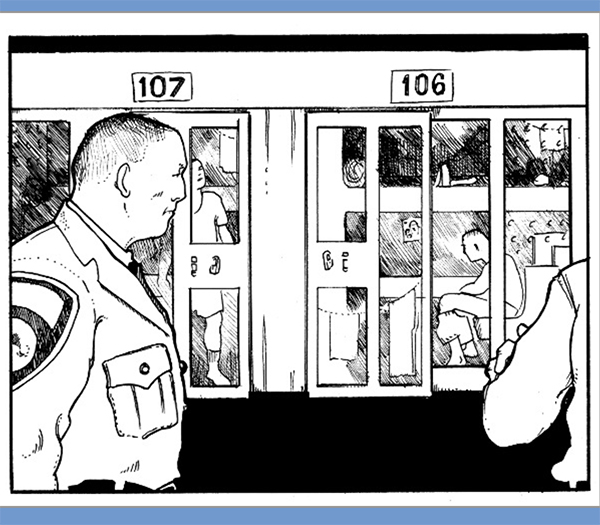
Thank you for acknowledging this letter. As an incarcerated person of a continuous three decades, and from an intersectionality of marginalized groups, I wanted to offer a unique lens from which I view the topic of reparations.
I will begin by responding to people such as Mitch McConnell, who believes slavery is “something that happened 150 years ago,” and has nothing to do with today. Please consider the following counter perspective:
- Under the U.S. Constitution, and most state constitutions, slavery is currently allowed if the person has been convicted of a crime. It is the “loophole” for modern-day servitude.
- Under the current model of incarceration that we have chosen, prisons are a direct extension of slavery (and Jim Crow), both in structure and culture. When I read “Souls of Black Folk,” by W.E.B. DuBois, I see many old practices of DuBuis’ day currently being played out in my life.
- As an incarcerated person, my body is wholly subjected to the whims of the prison guards. Through the years, I have repeatedly seen Abu Ghraib played out right here in America on my peers. (Many published lawsuits in Prison Legal News bear this out.) During COVID, as I watched nine of my peers die in a month’s time, the neglect, indifference, and apathy was a reminder that we-as a mass-are worthless, disposable-we don’t matter. It was a poignant reinforcement of the daily messaging we receive from, either verbally or indirectly by treatment. Like chattel slavery, prisons are not about “corrections” (because education and programs stimulate cognitive function) but collective traumatization. Traumatization that extends through undeniable social patterns from historic slavery, to Jim Crow, to targeted bias and treatment that is spelled out in long-standing disproportionate statistics.
- My labor (forced as it is) is exploited, profited upon, and through external pressures, has widened the concept of rehabilitation. Recently, my life, my body, my very existence has literally been for the benefit of others. (Guards like to tell us that our incarceration paid off their houses, put their kids through college, etc.)
- Like slavery, I am forced to exist in an environment that is killing me slowly. Statistics bear out that people released from long prison terms live shorter life spans due to chronic stress, and the inhumane living conditions of prison, e.g., high salt intake due to long-term consumption (forced) of processed foods, canteens that only sell junk food, lack of exercise due to lockdowns and modified programs—either semantic term has the same adverse effect, chronic stress due to racist or abusive guards, internecine physical violence due to an adverse structure (compare to Germany or Norway which has a much greater success rate on every level because they don’t attempt to rehabilitate humans in literal cages) and the prison administration’s acquiescence of an anti-social and generally adverse penal culture.
- It is a well-known fact that people of color are disproportionately imprisoned, and for longer periods of time than their counterparts. This pattern affects our ability to procreate, which affects our general populations, en masse (I am African American), in myriad adverse ways. In the end, as a whole, modern prisons, by design, have the same effect as antebellum slavery: creating dependence, exacting subservience, reinforcing superiority of a particular race (most guards are white, while most prisoners are POC. The guards who are POC fall in line with the culture.)
- Like slavery, we are labeled as incorribgable, violent, gang members, etc., whenthe physical structure of prisons influences, and even reinforces, “predictable violence” through deprivation.
- Our property can be confiscated-and regularly is for “being altered,” meaning, e.g., the body of the radio cracked, but the radio still functions.
As a population coming predominately from poverty, we try to save our property until it becomes completely inoperable. Confiscating operable property because it is flawed, and causing us to repeatedly have to replace items we, or our families cannot afford is an undue hardship, but is legal because we are slaves; and it is all justified as “security.” (Recently my watch band broke and an officer confiscated the entire watch.) - My word against an officer is devalued and discounted as a slave. Just like Jim Crow. (And recently the Orange County Register reported on how dangerous this cultural set is when women in female institutions were raped by guards and no one believed them until a hidden camera was placed.) I have no rights (that I can prove), and I am constantly controlled, instead of being taught to be autonomous beings with self-determination. We are slaves and feel like slaves.
With all of this said, there is no question that people who commit offenses should be held accountable, but as a civil and morally-guarded society, we should want to help those who are sick by providing a healthy and humane environment where incarcerated persons can transform themselves and become better human beings. Where we incarcerated persons can become genuine contributors to larger society. The current prison structure, extended from slavery, convict leasing, and Jim Crow, does nothing more than mirror these old and shameful relics.
In an attempt to be as concise as possible, this is how slavery continues to affect us today, and how it is a direct link from slavery. I am many.
Thank you for the opportunity to contribute to this conversation.
